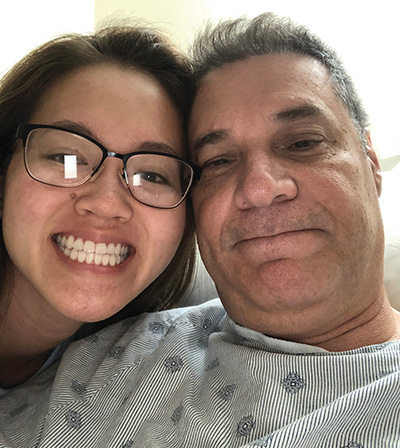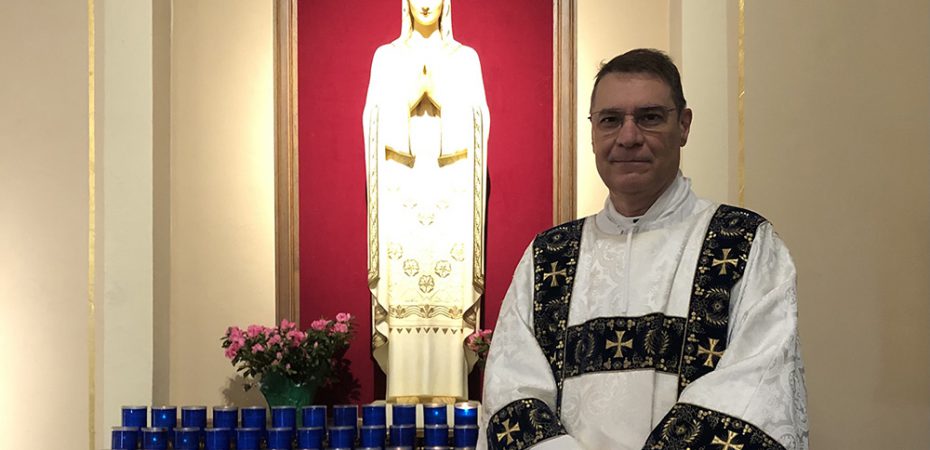Cancer and the Multidimensional Function of Ministry
Learning to let go and let others lead
Deacon Donald Michael Comments Off on Cancer and the Multidimensional Function of Ministry
The lessons learned these many months, with my fight against cancer, are both personal and professional. As a deacon and occupational therapist, I have tried to put my diaconal call of service to every patient and colleague I work with. It has been a challenge to put my practice and active ministry on hold, for more than a year, as I work through the challenges of this disease. I have learned ministry is a two-way street. I am learning to accept this, although it remains uncomfortable. I call this the multidimensional lessons of ministry. It is also a lesson, I believe, most deacons can benefit from.
My calling as a clinician and deacon was severely challenged when my wife and I received the dreaded news at the University of Michigan Medical Center, Ann Arbor, Michigan. I was diagnosed with an anterior mediastinal yolk sac tumor that was stage 3. Trying to wrap my head around the situation, the oncologist gave the prognosis and treatment options. My options were limited. I could not return to work. The chemotherapy, with subsequent surgery, was going to take me away from my comfort zone of being in charge. I was facing dependency on others for medical assistance and basic activities of daily living.
Calling my employer was difficult. Although her support and the support of the organization I work for were outstanding, I demonstrated difficulty in letting go of my independence and role as a servant leader. I was becoming the person(s) I usually serve. Self-conditioned to be the servant leader, I incorporated my life as a deacon into the professional role as a rehabilitation professional before my patients and colleagues. I was 100% incorporated into this. It was time to let go and let others, especially Jesus, take the lead, hold my hand and get me through this challenge.
My priest and colleagues at the parish were very understanding and supportive. Their prayers and the prayers of the faith community helped me deal with and fight this disease. Their example helped me discover that those in ministry need occasional reminders that we are all, one day, going to be ministered to.
Intellectually, I always knew that I would face dependency. It was, however, put off as I imagined that my reliance upon others would be long into the future, into my old age as I faced my final days on this earth. It came as a surprise that at the height of my professional success, the culmination of my life goals, I was facing the aid and total reliance upon God and those he placed into my life.
Catechetical Moment
It was a catechetical moment, lying in the hospital bed as the chemotherapy drugs were pumped into my peripherally inserted central catheter (PICC) line. The sickness, fatigue, weakness, hair loss, neuropathy and poor endurance/balance came too soon. I became dependent on bathing, dressing, preparing meals and communication as my energy was too low for taking personal phone calls. It was painful to tell my mother, in her 80s, that I could not talk too long, as it was taking a toll on my endurance. I was fortunate to have friends and family encouraging me to “hang in there” and persevere through the challenges ahead.

I prided myself on being stoic and strong. Yet during these weakest moments I learned that my dependence upon God, my family, the medical team, colleagues and friends was a time of healing and discovery. I learned that ministry is not for the self-reliant.
Karen, my wife, was at my bedside praying or reading as she tended to my needs. My colleagues from work wrote strong text messages admonishing me to rely upon Christ as they encouraged me to get through the challenges of cancer. My family was there to visit me, overlooking the disease that caused me to wither from 210 pounds to 170, the inability to keep food down and hair loss.
While lying in bed, a nurse, in the middle of the night, held my hand and asked if there was anything she could do. I was in my most vulnerable state of helplessness. My sense of self-authority was gone, my strength was depleted. I admitted that I needed someone to talk to as my wife was at home getting the rest she sorely needed.
The nurse listened to my story and advised me that I was not alone. She explained that I belong to a club of healthcare professionals and ministers who mistakenly identify themselves by what they do instead of who they are. She reminded me to be the human God made me to be, not what I thought I should be in my ministry as a deacon and therapist.
She explained that I was the toughest type of patient because we are not demanding or abrasive, it is because we fail to ask for help when it is most needed. I discovered through her, my wife, my family and friends, through their example of love, that we are all dependent upon the mercy of God. It was a hard lesson. It was the medicine I needed.
Lessons Learned
Cancer taught me to say “no” to the self-awarding desire of being there for every opportunity placed before me. I carefully consider, with prayer and spiritual direction, any new roles concerning my service as a deacon. I know others who Christ also calls can take the load.
As I am in remission, I ask all deacons (and their wives) to consider that our ministry is addictive in both positive and negative ways. The positive side of being a deacon is the reward of knowing you are following the call of Christ to be there for those who would, generally, fall through the cracks of the ministries available within the Church and with marketplace ministry. It offers the satisfaction that we are doing something important. It is important. We are demonstrating ourselves as the icon of Christ the Servant outside the walls of the institutional Church.
………………………………………………………………………………………………………………………………………………………….
PATRON SAINT OF CANCER
St. Peregrine Laziosi (1260-1345) is the patron saint of those suffering from cancer. Developing an infection in his leg, St. Peregrine was to have an amputation. He prayed before a fresco of the Crucifixion and fell into a deep trance. Jesus descended from the cross to touch his leg. The following day, his leg showed no sign of the infection. The National Shrine of St. Peregrine is located in Our Lady of Sorrows Basilica in Chicago.
…………………………………………………………………………………………………………………………………………………………..
Nonetheless, there is the unhealthy side of ministry that can give the illusion that we are under our own control as ministers of the Gospel. When we fall into this trap, as I did, we learn the hard lesson that the Gospel is not under our control. It belongs to Christ. We serve under his terms and conditions. We need to be taught the lessons of the Gospel through the example of others. Even if it makes us uncomfortable. Even if it makes us dependent. For truly we are.
It is not by selfish intent we become deacons. I merely forgot that ministry, if understood correctly, is a multidimensional encounter with a Loving God who brings living people into our lives who minister to us as we are to minister to them. I am learning to let go of the “heroism” and “control” that comes with the role of ministry and clinical professionalism. I am discerning that there is a place for everything that must include God and the people he places in our lives. I am discovering, through the lesson of Luke 23:46: We are in his hands, not ours.
DEACON DONALD MICHAEL is incardinated in the Roman Catholic Diocese of Lansing and serves at St. Anthony Catholic Church, Hillsdale, Michigan.





